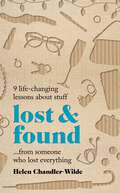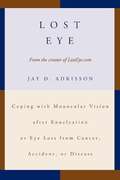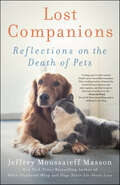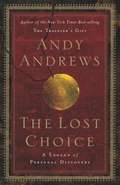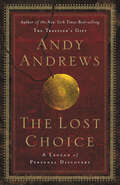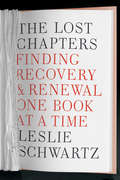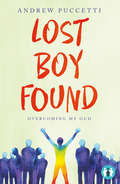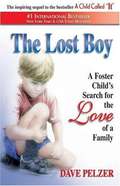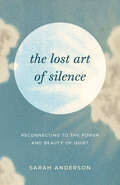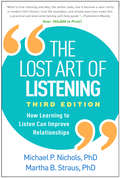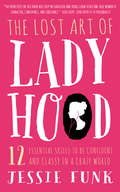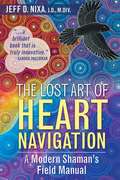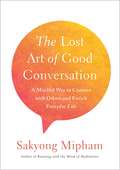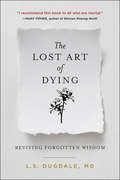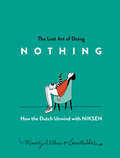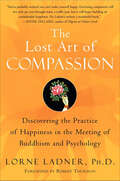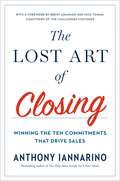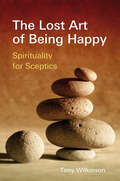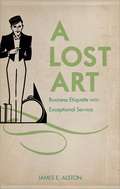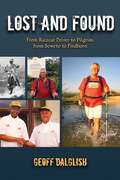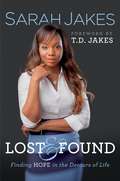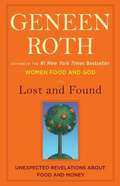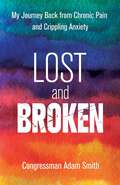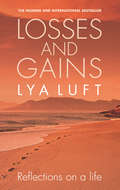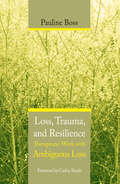- Table View
- List View
Lost & Found: 9 life-changing lessons about stuff from someone who lost everything
by Helen Chandler-WildeAn exploration into why we keep holding on to material things and what they mean to usOn New Year's Eve of 2018, journalist Helen Chandler-Wilde lost everything she owned in a storage unit fire in Croydon, where she'd stowed all her possessions after a big break-up. She was left devastated, and forced to re-evaluate her relationship with owning material things. A mix of memoir, self-help and journalism, Lost & Found explores the psychological reasons for why we buy and keep the things we do, and explains how we can liberate ourselves from the tyranny of 'too much'. Helen interviews people from all walks of life, including behavioural psychologists on the science of nostalgia, a nun on what it's like to own almost nothing and consumer psychologists on why we spend impulsively, to help us better understand why we're surrounded by clutter and what we can do to change it.This smart-thinking book explains the sociological quirks of human nature and the fascinating science behind why we buy and hold onto things. By the end of it, your relationship with your belongings will be changed forever.
Lost Eye: Coping with Monocular Vision After Enucleation or Eye Loss from Cancer, Accident, or Disease
by Jay D. AdkissonLost Eye is a collection of e-mails and message threads from Jay Adkisson's LostEye.com website, along with articles and other helpful information to help persons who have lost an eye to cope with the experience. The message is that life can continue as normal after the loss of an eye, and that there are many other people who are similarly situated and have successfully coped with the loss of an eye for many years.
Lost Companions: Reflections on the Death of Pets
by Jeffrey Moussaieff MassonA heartfelt exploration of human grief after the loss of a pet by the New York Times bestselling author of Dogs Never Lie About Love.Over 84 million Americans—almost 3/4 of the US population—own a pet, and our society is still learning how to recognize and dignify that relationship with proper mourning rituals. We have only recently allowed the conversation of how to grieve for our non-human family members to come front and center.Lost Companions fills a specific, important demand, a massive need in the market for an accessible, meaningful book on pet loss. Jeffrey Moussaieff Masson takes a very personal, heartfelt approach to this difficult subject, allowing readers to explore their own responses and reactions, suggesting ways through and out of grief, as well as meaningful ways to memorialize our best friends. Lost Companions is full of moving, thought-provoking and poignant stories about dogs, cats, horses, birds, wombats and other animals that beautifully illustrate the strong bond humans form with them.
The Lost Choice: A Legend of Personal Discovery
by Andy AndrewsA work of both scholarship and imagination, The Lost Choice is a legend of personal discovery--a reminder of the opportunities we each are given. When a young boy finds a mysterious object in the creek near his home, it starts a series of events that could change the world--again. Many search for the ancient relic's secret, but few find its truer purpose. What choices will each make--or lose?
The Lost Choice: A Legend of Personal Discovery
by Andy Andrews.A work of both scholarship and imagination. The Lost Choice is a legend of personal discovery—a reminder of the opportunities we each are given.When a young boy finds a mysterious object in the creek near his home, it starts a series of events that could change the world—again. Many search for the ancient relic's secret, but few find its truer purpose. What choices will each make—or lose?
The Lost Chapters: Finding Recovery and Renewal One Book at a Time
by Leslie SchwartzLeslie Schwartz's powerful, skillfully woven memoir of redemption and reading, as told through the list of books she read as she served a 90 day jail sentence In 2014, novelist Leslie Schwartz was sentenced to 90 days in Los Angeles County Jail for a DUI and battery of an officer. It was the most harrowing and holy experience of her life.Following a 414-day relapse into alcohol and drug addiction after more than a decade clean and sober, Schwartz was sentenced and served her time with only six months' sobriety. The damage she inflicted that year upon her friends, her husband, her teenage daughter, and herself was nearly impossible to fathom. Incarceration might have ruined her altogether, if not for the stories that sustained her while she was behind bars--both the artful tales in the books she read while there, and, more immediately, the stories of her fellow inmates. With classics like Edith Wharton's Ethan Frome to contemporary accounts like Laura Hillenbrand's Unbroken, Schwartz's reading list is woven together with visceral recollections of both her daily humiliations and small triumphs within the county jail system. Through the stories of others--whether rendered on the page or whispered in a jail cell--she learned powerful lessons about how to banish shame, use guilt for good, level her grief, and find the lost joy and magic of her astonishing life. Told in vivid, unforgettable prose, The Lost Chapters uncovers the nature of shame, rage, and love, and how instruments of change and redemption come from the unlikeliest of places.
Lost Boy Found: Overcoming My OCD (Inspirational Series)
by Andrew PuccettiAndrew Puccetti's life seemed perfect: he grew up in a loving Catholic community, his parents were happily married, and his childhood was good. But this picture-perfect existence started to crack when Andrew began to suffer from intense hypochondria and anxiety. Through therapy, he thought he had recovered, and, as he grew, he began to discover himself. He found the strength to come out as gay to his family, and everything seemed fine for a while.However, when he opened up to his group of friends about his sexuality, not all of them were as accepting as his family had been. Abandoned by his closest friend since childhood, his negative mental thoughts began to return, and Andrew found himself unable to cope with life, and forced to drop out of school. After months of isolation, Andrew took the brave step of admitting himself to a psychiatric hospital. Diagnosed with OCD, major depressive disorder, and borderline personality disorder, Andrew could finally begin to take control of his life. In Lost Boy Found, Andrew courageously tells his story of navigating adolescence through the lens of mental illness and finding peace with his true self.
The Lost Boy: A Foster Child's Search for the Love of a Family
by Dave PelzerImagine a young boy who has never had a loving home. His only possessions are the old, torn clothes he carries in a paper bag. The only world he knows is one of isolation and fear. Although others had rescued this boy from his abusive alcoholic mother, his real hurt is just beginning -- he has no place to call home. This is Dave Pelzer's long-awaited sequel to A Child Called "It". In The Lost Boy, he answers questions and reveals new adventures through the compelling story of his life as an adolescent. Now considered an F-Child (Foster Child), Dave is moved in and out of five different homes. He suffers shame and experiences resentment from those who feel that all foster kids are trouble and unworthy of being loved just because they are not part of a "real" family. Tears, laughter, devastation and hope create the journey of this little lost boy who searches desperately for just one thing -- the love of a family.
The Lost Art of Silence: Reconnecting to the Power and Beauty of Quiet
by Sarah AndersonA unique celebration of silence—in art, literature, nature, and spirituality—and an exploration of its ability to bring inner peace, widen our perspectives, and inspire the human spirit in spite of the noise of contemporary life.Silence is habitually overlooked—after all, throughout our lives, it has to compete with the cacophony of the outside world and our near-constant interior dialogue that judges, analyzes, compares, and questions. But, if we can get past this barrage, there lies a quiet place that&’s well worth discovering.The Lost Art of Silence encourages us to embrace this pursuit and allow the warm light of silence to glow. Invoking the wisdom of many of the greatest writers, thinkers, contemplatives, historians, musicians, and artists, Sarah Anderson reveals the sublime nature of quiet that&’s all too often undervalued. Throughout, she shares her own penetrating insights into the potential for silence to transform us. This celebration of silence invites us to widen our perspective and shows its power to inspire the human spirit in spite of the distracting noise of contemporary life.
The Lost Art of Listening, Third Edition: How Learning to Listen Can Improve Relationships (Guilford Family Therapy Ser.)
by Michael P. Nichols Martha B. Straus"That isn't what I meant!" Truly listening and being heard is far from simple, even between people who care about each other. This perennial bestseller--now revised and updated for the digital age--analyzes how any conversation can go off the rails and provides essential skills for building mutual understanding. Thoughtful, witty, and empathic, the book is filled with vivid stories of couples, coworkers, friends, and family working through tough emotions and navigating differences of all kinds. Learn ways you can: *Hear what people mean, not just what they say. *Share a difference of opinion without sounding dismissive. *Encourage uncommunicative people to open up. *Make sure both sides get heard in heated discussions. *Get through to someone who never seems to listen. *Ask for support without getting unwanted advice. *Reduce miscommunication in texts and online. From renowned therapist Michael P. Nichols and new coauthor Martha B. Straus, the third edition reflects the huge impact of technology and social media on relationships, and gives advice for talking to loved ones across social and political divides
The Lost Art of Ladyhood: 12 Essential Skills to be Confident & Classy in a Crazy World
by Jessie FunkIn a world where women and girls are constantly under attack from the media with photoshopped, airbrushed images and pop-stars that tell them all they need to do is party all the time, kiss a lot of boys, be a “mean girl” to gain popularity, max their credit cards to buy designer clothes, etc., The Lost Art of Ladyhood communicates the counterpoint to those of our teen pop stars. Happiness does not come from revealing all your skin, going clubbing every weekend where you get so drunk you don’t remember who you kissed, or maxing your credit cards just so you can buy the latest designer jeans. Happiness comes from living a life of character. Teaching girls how to be ladylike has little to do with crossing your ankles and sipping tea correctly; it’s about giving them tools and skills they can use to serve others, to be grateful, to think positively, to set powerful goals, to protect themselves from toxic relationships, and to learn to love themselves enough to where they learn to love others. The Lost Art of Ladyhood is a road map for navigate your way to confidence, classy-ness, character, and learning the lost art of being a lady.
The Lost Art of Heart Navigation: A Modern Shaman’s Field Manual
by Jeff D. NixaDiscover your soul’s purpose by following the shamanic path of the heart • Explains how to engage your heart’s navigational guidance system to access your spiritual core directly and find your life purpose and spiritual identity • Includes shamanic practices to meet your power animals, consult with spirit guides, embark on journeys in the spirit world, slay your inner dragons of self-sabotage and fear, clear emotional wounding patterns, and find your personal spirit song • Offers case studies and troubleshooting help for common pitfalls and obstacles on the heart-centered shamanic path • Includes access to 4 guided audio journeys narrated by the author Each of us has a vision for our lives, our soul’s purpose awaiting release in our hearts. The most important task we have is to learn what that purpose is and then bring it into the world. In our world of endless busyness and “hurry sickness,” many people are experiencing soul loss as they live out dreams of endless motion, empty tasks, anxiety, and negative thoughts. But you can change your world and discover the shamanic heart path that activates your wildness, your power, and your soul’s purpose. Blending earth-honoring shamanic practices and modern depth psychology, Jeff Nixa explains how to practice the lost art of heart navigation to help you find your life purpose and spiritual identity, conquer the fear, doubt and criticism that stand in the way of that vision, and become a shamanic shapeshifter of your life. Providing heart-opening exercises to slow your mental racing and detect your heart’s navigational guidance system, he shows how to awaken your wild and free heart, access your spiritual core directly, deactivate trauma-based emotional patterns, retrieve vital energy, work with your dreams, and become an artist of the soul. You will learn how to meet your power animals and consult with spirit guides, embark on shamanic journeys in the spirit world for help and information, slay your inner dragons of self-sabotage, find your personal spirit song, and create the joyful life that your heart is attuned to seek out. Offering case studies and troubleshooting help for common pitfalls and obstacles on the heart-centered path, this shamanic manual provides hands-on practices and ceremonies--including access to 4 guided audio journeys narrated by the author--as well as wisdom from the author’s own journey and the powerful teachers he has worked with, including Sandra Ingerman, Mikkal, spiritual elders of the Oglala Lakota people, and plant-spirit medicine shamans of the Amazon jungle. Allowing you to understand the precise contours of your authentic self and your visionary heart, this book offers a map to a vibrant new life aligned with your soul and deepest calling.
The Lost Art of Good Conversation: A Mindful Way to Connect with Others and Enrich Everyday Life
by Sakyong MiphamCutting through all the white noise, chatter, and superficiality our cell phones and social media cause, one of Tibet's highest and most respected spiritual leaders offers simple and practical advice to help us increase our attentions spans, become better listeners, and strive to appreciate the people around us.In a world of iPhones and connectivity to social media and email, we are all in constant connection with one another. Then why are so many people feeling burned out, distant from colleagues, and abandoned by family and friends? In this new book from the bestselling author of Running with the Mind of Meditation, the Sakyong uses the basic principles of the Shambhala tradition--meditation and a sincere belief in the inherent wisdom, compassion, and courage of all beings--to help readers to listen and speak more mindfully with loved ones, co-workers, strangers, and even ourselves. In this easy to understand and helpful book, Sakyong Mipham provides inspiring ideas and practical tips on how to be more present in your day-to-day life, helping us to communicate in ways that elevates the dignity of everyone involved. Great for families, employees and employers and everyone who spend too much time on Facebook, Instagram, and feel "disconnected" in our "connected" world, Good Conversation is a journey back to basics.
The Lost Art of Dying: Reviving Forgotten Wisdom
by L. S. DugdaleA Columbia University physician comes across a popular medieval text on dying well written after the horror of the Black Plague and discovers ancient wisdom for rethinking death and gaining insight today on how we can learn the lost art of dying well in this wise, clear-eyed book that is as compelling and soulful as Being Mortal, When Breath Becomes Air, and Smoke Gets in Your Eyes. As a specialist in both medical ethics and the treatment of older patients, Dr. L. S. Dugdale knows a great deal about the end of life. Far too many of us die poorly, she argues. Our culture has overly medicalized death: dying is often institutional and sterile, prolonged by unnecessary resuscitations and other intrusive interventions. We are not going gently into that good night—our reliance on modern medicine can actually prolong suffering and strip us of our dignity. Yet our lives do not have to end this way. Centuries ago, in the wake of the Black Plague, a text was published offering advice to help the living prepare for a good death. Written during the late Middle Ages, ars moriendi—The Art of Dying—made clear that to die well, one first had to live well and described what practices best help us prepare. When Dugdale discovered this Medieval book, it was a revelation. Inspired by its holistic approach to the final stage we must all one day face, she draws from this forgotten work, combining its wisdom with the knowledge she has gleaned from her long medical career. The Lost Art of Dying is a twenty-first century ars moriendi, filled with much-needed insight and thoughtful guidance that will change our perceptions. By recovering our sense of finitude, confronting our fears, accepting how our bodies age, developing meaningful rituals, and involving our communities in end-of-life care, we can discover what it means to both live and die well. And like the original ars moriendi, The Lost Art of Dying includes nine black-and-white drawings from artist Michael W. Dugger. Dr. Dugdale offers a hopeful perspective on death and dying as she shows us how to adapt the wisdom from the past to our lives today. The Lost Art of Dying is a vital, affecting book that reconsiders death, death culture, and how we can transform how we live each day, including our last.
The Lost Art of Doing Nothing: How The Dutch Unwind With Niksen
by Maartje Willems“The best thing about niksen is the absence of a goal. It doesn’t serve a purpose, but it’s wonderful.” Don’t you think it’s time for a break? Plagued—as we are!—by nonstop pings and notifications, we have lost the knack of zoning out. Kicking back. Slacking off. Even when pandemic-induced lockdowns forcibly cleared our calendars, many who thought I’m free! filled their days with Netflix and doomscrolling. How can we reclaim our free time (planned or not) to truly rest and reset? The Dutch have it figured out: with niksen. Perhaps their best-kept lifestyle secret, niksen is the art of doing, well, nothing. It’s the opposite of productivity, and it’s incredibly good for your . . . MIND—it makes you calmer. BODY—it offers rest on hectic days. CREATIVITY—it clears a space for brilliant ideas. WALLET—it’s free! If you’re waiting for an invitation to go lie down in the sunshine, this book is it.
The Lost Art of Compassion: Discovering the Practice of Happiness in the Meeting of Buddhism and Psychology
by Lorne LadnerNow in paperback, this practical guide to cultivating compassion delivers Buddhist and psychological insight right where we need it most—navigating the difficulties of our daily lives. Compassion is often seen as a distant, altruistic ideal cultivated by saints, or as an unrealistic response of the naively kind-hearted. Seeing compassion in this way, we lose out on experiencing the transformative potential of one of our most neglected inner resources.Dr Lorne Ladner rescues compassion from this marginalised view, showing how its practical application in our life can be a powerful force in achieving happiness. Combining the wisdom of Tibetan Buddhism and Western psychology, Ladner presents clear, effective practices for cultivating compassion in daily living.
The Lost Art of Closing: Winning the Ten Commitments That Drive Sales
by Anthony Iannarino“Always be closing!” —Glengarry Glen Ross, 1992 “Never Be Closing!” —a sales book title, 2014 “?????” —salespeople everywhere, 2017For decades, sales managers, coaches, and authors talked about closing as the most essential, most difficult phase of selling. They invented pushy tricks for the final ask, from the “take delivery” close to the “now or never” close. But these tactics often alienated customers, leading to fads for the “soft” close or even abandoning the idea of closing altogether. It sounded great in theory, but the results were often mixed or poor. That left a generation of salespeople wondering how they should think about closing, and what strategies would lead to the best possible outcomes. Anthony Iannarino has a different approach geared to the new technological and social realities of our time. In The Lost Art of Closing, he proves that the final commitment can actually be one of the easiest parts of the sales process—if you’ve set it up properly with other commitments that have to happen long before the close. The key is to lead customers through a series of necessary steps designed to prevent a purchase stall. Iannarino addressed this in a chapter of The Only Sales Guide You’ll Ever Need—which he thought would be his only book about selling. But he discovered so much hunger for guidance about closing that he’s back with a new book full of proven tactics and useful examples. The Lost Art of Closing will help you win customer commitment at ten essential points along the purchase journey. For instance, you’ll discover how to:· Compete on value, not price, by securing a Commitment to Invest early in the process. · Ask for a Commitment to Build Consensus within the client’s organization, ensuring that your solution has early buy-in from all stakeholders. · Prevent the possibility of the sale falling through at the last minute by proactively securing a Commitment to Resolve Concerns.The Lost Art of Closing will forever change the way you think about closing, and your clients will appreciate your ability to help them achieve real change and real results.\
The Lost Art of Being Happy
by Tony WilkinsonArguing that spirituality is not about religion but about living happily, this guidebook offers advice on the skills of the inner life-the mind and emotions-that are needed for a life of gladness. This examination discusses the requirements for happiness, explores their nature, and shows that mastering a set of five of them leads to bliss. The exercises in this resource are offered to spiritual seekers as a path towards happiness and emphasize that personal elation is not caused by external events, but by mastering the skills of the inner life.
A Lost Art: Business Etiquette with Exceptional Service
by James E. AlstonThis book talks about training staff, having the least amount of surprise turnover of employees, and the benefit to keeping customers wowed. This book is a reminder and inspiration to customers, employees, and employers to engage in practical business etiquette for common betterment.
Lost and Found
by Geoff DalglishTackling the goal to walk 25,000 miles -the equivalent of the circumference of the planet - one man shares life-changing insights through his personal travel vignettes. Formerly a thrill-seeking journalist, Geoff Dalglish begins his impressive expedition after undergoing a spiritual and ecological awakening at the Findhorn center in Scotland. His deliberate journey from Timbuktu to Antarctica to Hollywood unfolds in vivid and inspiring detail, revealing a wealth of unimaginable experiences while sharing a message about treading lightly on the Earth. From the horrors of bloody civil unrest and death-defying moments at the hands of armed guerilla soldiers to close encounters with the animal kingdom and finding healing balm within spiritual communities, this roller coaster of adventure chronicles a deeper quest for meaning that culminates in the joys of a life lived in simplicity and service.
Lost and Found: Finding Hope in the Detours of Life
by Sarah Jakes T. D. JakesDon't let your past keep you from a full future. Like every girl, Sarah Jakes dreamed of a life full of love, laughter, and happy endings. But her dreams changed dramatically when she became pregnant at age thirteen, a reality only compounded by the fact that her father, Bishop T. D. Jakes, was one of the most influential megachurch pastors in the nation. As a teen mom and a high-profile preacher's kid, her road was lonely. She was shunned at school, gossiped about at church. And a few years later, when a fairy-tale marriage ended in a spiral of hurt and rejection, she could have let her pain dictate her future. Instead, she found herself surrounded by a God she'd given up on, crashing headlong with Him into a destiny she'd never dreamed of. Sarah's captivating story, unflinchingly honest and deeply vulnerable, is a vivid reminder that God can turn even the deepest pain into His perfection. More than a memoir, "Lost and Found" offers hope and encouragement. Perhaps you, like Sarah, find yourself wandering the detours of life. Regardless of how lost you feel, you, too, can be found.
Lost and Found: One Woman's Story of Losing Her Money and Finding Her Life
by Geneen RothThe #1 New York Times bestselling author of Women Food and God maps a path to meeting one of our greatest challenges-how we deal with money. When Geneen Roth and her husband lost their life savings in the Bernard Madoff debacle, Roth joined the millions of Americans dealing with financial turbulence, uncertainty, and abrupt reversals in their expectations. The resulting shock was the catalyst for her to explore how women's habits and behaviors around money-as with food-can lead to exactly the situations they most want to avoid. Roth identified her own unconscious choices: binge shopping followed by periods of budgetary self-deprivation, "treating" herself in ways that ultimately failed to sustain, and using money as a substitute for love, among others. As she examined the deep sources of these habits, she faced the hard truth about where her "self-protective" financial decisions had led. With irreverent humor and hard-won wisdom, she offers provocative and radical strategies for transforming how we feel and behave about the resources that should, and can, sustain and support our lives.From the Trade Paperback edition.
Lost and Broken: My Journey Back from Chronic Pain and Crippling Anxiety
by Congressman Adam SmithAdam Smith, 26-year member of Congress and Chair of the House Armed Services Committee for the last four years, offers a candid memoir about his years-long struggle with anxiety and chronic pain, and the winding path to find the right diagnosis and treatment.&“Early one morning in April of 2016 I woke up and seriously contemplated the possibility that I would never be able to generate the strength, focus, and courage to get out of bed. The combination of crippling anxiety, chronic pain, muscle atrophy, and the fascinating mix of pharmaceuticals coursing through my body had, I feared, finally broken me. My life terrified me. I had been fighting some combination of these battles for just over three years at this point, and I didn&’t think I could do it for one more day.&” Representative Adam Smith was successful by all measures, with a long, distinguished career in Congress and a loving marriage with children. Yet seemingly out of nowhere, his body and mind broke down to the point where every day was a relentless struggle to just keep moving. It&’s a struggle millions of Americans know all too well. Would he be able to meet his responsibilities as a husband and father? Could he still maintain his breakneck professional schedule and continue to do his job well? He soon realized he couldn&’t will himself well—he needed help. Thus began a desperate search for the right diagnosis and treatment for his mental and physical pain that lasted over six years and involved more than a hundred different health care providers. With unflinching honesty, Smith reveals how he got to this lowest point in life, and how he slowly, painfully, and unevenly found his way back to having a calmer mind and being free of chronic pain and medication. Smith discovered the severe limitations of our nation&’s health care system, and brought him face to face with the cost of the stigma our country has against admitting to and dealing with mental health issues. He learned that life isn&’t about finding that quick fix or clear-cut mental and physical program to stop worrying and struggling. It&’s about learning who you are, understanding your body and mind well enough to face those struggles that we will all inevitably face, and then being able to enjoy your life even when those struggles come.
Losses and Gains: Reflections on a Life with a Foreword by Paolo Coelho
by Lya Fett LuftIn her bestselling book Losses and Gains, Lya Luft draws on her own experiences of loss and gain in marriage and family to address the universal themes of childhood, love and maturity. She portrays love as the common thread through all phases of life. As children, the unconditional love we receive from our parents determines our expectations for all the other forms of love we experience later. And as adults, she argues, the complex task of loving another depends, initially, on self-love and self-esteem. Luft's ardent reflections on existence and the human spirit are a powerful reminder to us all: we have lost everything only when we believe we deserve less than everything still to be gained.
Loss, Trauma, and Resilience: Therapeutic Work With Ambiguous Loss (Norton Professional Bks.)
by Pauline BossAll losses are touched with ambiguity. Yet those who suffer losses without finality bear a particular burden. Pauline Boss, the principal theorist of the concept of ambiguous loss, guides clinicians in the task of building resilience in clients who face the trauma of loss without resolution. Boss describes a concrete therapeutic approach that is at once directive and open to the complex contexts in which people find meaning and discover hope in the face of ambiguous losses. In Part I readers are introduced to the concept of ambiguous loss and shown how such losses relate to concepts of the family, definitions of trauma, and capacities for resilience. In Part II Boss leads readers through the various aspects of and target points for working with those suffering ambiguous loss. From meaning to mastery, identity to ambivalence, attachment to hope–these chapters cover key states of mind for those undergoing ambiguous loss. The Epilogue addresses the therapist directly and his or her own ambiguous losses. Closing the circle of the therapeutic process, Boss shows therapists how fundamental their own experiences of loss are to their own clinical work. In Loss, Trauma, and Resilience, Boss provides the therapeutic insight and wisdom that aids mental health professionals in not "going for closure," but rather building strength and acceptance of ambiguity. What readers will find is a concrete therapeutic approach that is at once directive and open to the complex contexts in which people find meaning and discover hope in the face of ambiguous losses.
